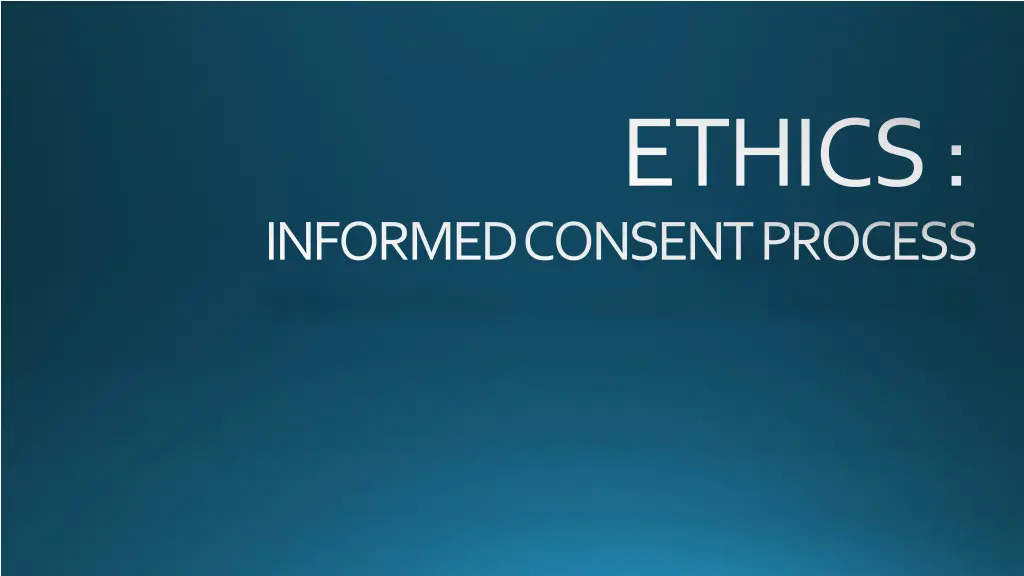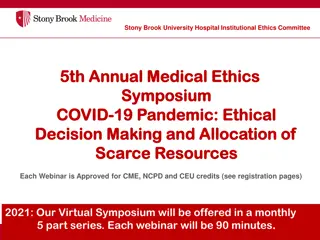
Understanding Research Ethics and Informed Consent Process
Explore the importance of research ethics, responsibilities of researchers, general principles of ICMR, moral principles of research ethics, ethical committees, and the informed consent process in research. Learn about protecting human participants, ensuring ethical conduct, and the role of ethical committees in upholding dignity and rights in research.
Download Presentation

Please find below an Image/Link to download the presentation.
The content on the website is provided AS IS for your information and personal use only. It may not be sold, licensed, or shared on other websites without obtaining consent from the author. If you encounter any issues during the download, it is possible that the publisher has removed the file from their server.
You are allowed to download the files provided on this website for personal or commercial use, subject to the condition that they are used lawfully. All files are the property of their respective owners.
The content on the website is provided AS IS for your information and personal use only. It may not be sold, licensed, or shared on other websites without obtaining consent from the author.
E N D
Presentation Transcript
ETHICS : INFORMED CONSENT PROCESS
RESEARCH ETHICS They are the moral principals that govern a persons behaviour. Research Ethics may be referred to morally and legally right in research. Responsibility of researcher to be honest and respectful to all individuals who are in the study and should not inflict harm on the research subjects. OBJECTIVES: 1. protect human participants 2. serves interests of individuals, groups and society 3. management of risk, protection of confidentiality and informed consent.
GENERAL PRINCIPLES OF ICMR: Essentiality Voluntariness, informed consent and community agreement Non-exploitation Privacy and confidentiality Precaution and risk minimization Professional competence Accountability and transparency Maximization of public interest and distributive justice Institutional arrangements Public domain Totality of responsibility Compliance
MORAL PRINCIPLES OF RESEARCH ETHICS: Non maleficence no harm to the researcher as well as research participants Beneficence benefit to mankind Autonomy-rights and dignity of individual to be considered Justice- benefits and risk should be fairly distributed among people.
ETHICAL COMMITTEE : Committee that reviews research to ensure that the researcher is conducting research ethically Comprises of at least 5 members from different fields. Committee may include- chairperson Basic medical science area Clinicians Legal expert Social scientist Philosopher Person from community Member secretary from same institute.
Responsibility of an IEC To protect the dignity, rights and well being of the potential research participants. To ensure that universal ethical values and international scientific standards are expressed in terms of local community values and customs. To assist in the development and the education of a research community to local health care requirements. Function of IEC: Review every research proposal on human participants before the research is initiated Ensure that scientific evaluation has been completed before ethical review is taken up.
INFORMED CONSENT PROCESS: A process by which a subject voluntarily confirms his or her willingness to participate in a particular trial, after having been informed of all aspects of the trial that are relevant to the subjects decision to participate. GUIDELINES : 1. ICMR (Indian council of Medical Research) 2000 2. GLP (good clinical practises)
INFORMATION VOLUNTARINESS COMPREHENSION
Informed consent is first and foremost a continuing process. This includes a person voluntarily agreeing to participate in a research study after being fully informed about it via verbal discussion with study staff, followed by documentation in a written, signed, and dated informed consent form. The participant has complete right to be notified of any changes to the study, along with any other information that may influence their decision to remain in the study. Researchers must ensure that informed consent process should not only concern the federal, state and local regulations but also respects each indviduals right to make a voluntary, informed decision.
INFORMED CONSENT FORM should include: Study purpose: the consent document must state : That the trial involves research The purpose of the trial 2. Study Treatment and Randomisation: Document must state the trial treatment and the probability for random assignment to each treatment ( if a randomized clinical trial). 3. Study Procedures Invasive procedures if any, the entire procedure explained in depth Participants responsibilities Experiemental aspects of the trial
4. Risks of taking part in the study The reasonably foreseeable risks or inconveniencies to participant and, when applicable, to an embryo, fetus, or nursing infant. 5. Benefits of taking part in the study The reasonably expected benefits. When there is no intended clinical benefits to the participant, the participant should be made aware of this. 6. Alternatives to taking part in the study The alternative procedures or course of treatment that may be available to the participant, and their important potential benefits and risks.
7. Costs of Participation and Compensation in the Event Injury : The compensation and/or treatment available to the participant in the event of trial-related injury. The anticipated expenses, if any, to the participant for participating in the trial. 8. Payment for taking part in the study : The anticipated prorated payment, if any, to the participant for participating in the trial. 9. Voluntary Nature of Study: Trial is voluntary and participants may refuse to participate or withdraw from the trial, at any time, without penalty or loss of benefits to which the participant is otherwise
10. Confidentiality of Personal Information: That the monitor, the auditor, the IRB and the regulatory authorities will be granted direct access to the participants original medical records for verification of clinical trial procedures and/or data, without violating the confidentiality of the participant, to the extent permitted by the applicable laws and regulations and that, by signing a written informed consent form, the participant s legal representative id authorizing such access. 11. New Information that may affect study Participation: The study participants have right to know any new update or information throughout the course of research, that may specifically affect the participation in the study.
12. Study Contacts : The information of person to contact for information or any questions related to the trial- related injuries. 13. Duration of participation and number of people taking part in the study : The expected duration of the participants participation in the trial. The approximate number of participants involved in the trial.
WHO CAN SIGN THE INFORMED CONSENT FORM? Subject or Legally acceptable representative Person conducting review of consent Impartial witness
Information provision and sharing by the research team Discussion and interaction between researchers and potential participants True Understanding Acceptance or Rejection of Participation Participation and follow up till completion End of contract






















